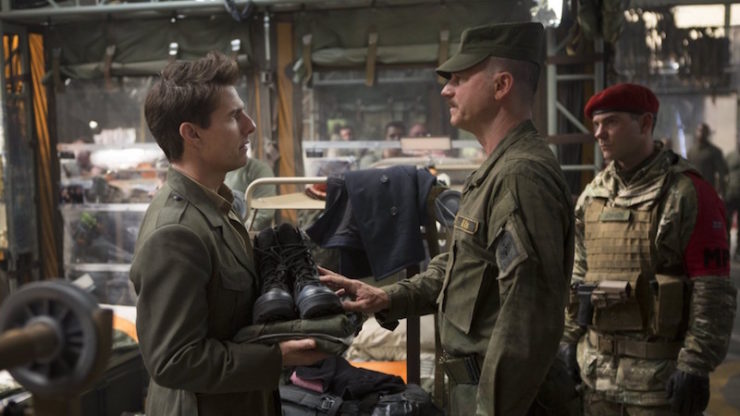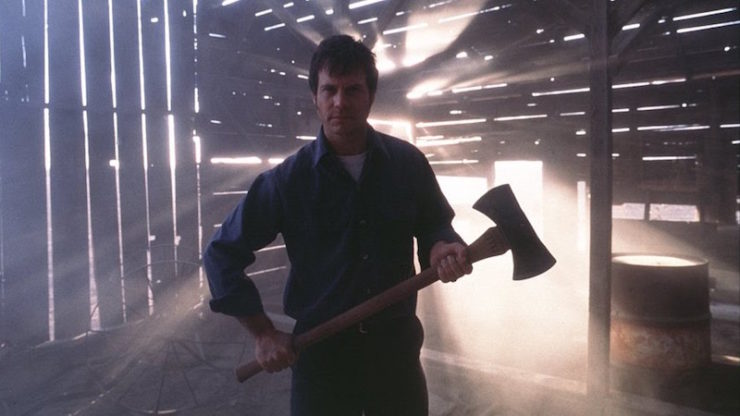Bill Paxton was genre cinema’s Jimmy Stewart: a performer who simply didn’t know how to turn in bad work. If you wanted a character that would show up, react honestly, and push the movie along, you got Paxton. It’s no accident his career involves on-screen confrontations with the Xenomorphs, Predators, and a Terminator. It’s also no accident that he was so prolific—Paxton’s everyman quality meant he was a solid fit anywhere in a cast list. You wanted a villain? You got Paxton. You wanted a well meaning but doomed second hero? Paxton. Good old boy who was neither old nor especially good? Paxton. Patriarch tortured by the multiple demands of his job, wives, political career and church? Paxton. Blue-haired punk? Golf-obsessed detective? Loud-mouthed marine? You name it, Bill Paxton played it, and played it better than anyone else ever could.
But it’s his lack of ego as a performer, and the honesty that springs from that, which I’ll always remember. For example, Paxton’s memorably blue-haired, mohawked turn in The Terminator requires him to do very little other than stand near Brian Thompson and get killed. But he attacks the role with such exuberance that you’re just a little sorry he gets killed…which, given that he’s trying to mug a naked man as the scene opens, is quite an achievement.
Private William Hudson is the role Paxton will always be best known for, in Aliens. Hudson is panicky and loud, a no-filtered loudmouth barely tolerated by his team before things goes sideways—but it’s only when they do that you see everything else that Paxton finds in the role. Hudson has a huge emotional journey across the movie. At first, he’s memorable because he’s the smart-ass; later, though, he’s memorable because he’s the one that comes apart. The macho, chest-pounding dudebro marine is replaced by a terrified young man not that far out of high school and millions of miles from where he grew up, with no idea how to cope with ANYTHING. His panic is ugly, untidy, mean. He’s a wounded animal who lashes out at the people in the same position as him, and it takes a good third of the movie for Hudson to shake it off. Vasquez and Hicks hold it together because that’s what they have to do. They also, you realise later, do so because Hudson isn’t able to, yet: they bitch and whine at him, and they need him to get back on his feet, but they have his back until he does. Hudson is family, even when he’s losing it. Especially when he’s losing it.
Which makes the moment when he finally steps up all the more poignant. There is no instant in the second half of Aliens where Hudson is even in the same time zone as okay: he’s terrified, panic stricken, and completely off his game. But he gets up and does the job anyway, because that’s what his friends are doing. Because that’s what a marine does. He yells “Game over, man! Game over!” long before he goes down, and when he does? He goes down fighting.
This is what Paxton was able to bring to the characters he played: honesty and realism. Hudson was more than his boasts and panic, but they were still part of him. He’s a man who faced his demons down and even if he didn’t beat them, he bloodied their noses on the way out. We all like to think we’d be Hicks or Ripley or Vasquez in that scenario; most of us would be Hudson. Paxton’s performance shows us that’s okay.
That honesty, that willingness to walk around a role and show you every side of it is what defines his ridiculously strong career. His turn as Morgan Earp in Tombstone is the whetstone that Kurt Russell uses to make his version of Wyatt razor sharp. Morgan thinks they can have a life outside violence, and is one of the first brothers to settle down. He’s idealistic, good natured and naive—a victim waiting to happen. He’s also never annoying or self-righteous. Instead, Paxton shows him as both a man in his own right and a younger version of Wyatt and Virgil. The older brothers’ idealism has been tempered and dented by years of real world experience. Morgan’s hasn’t, and he doesn’t survive long enough for that to happen. Paxton shows us that and, again, shows us a real person at the heart of this somewhat fictionalized story.
You see it again in 2001’s Frailty, a film that Paxton also directed. Frailty is one of the great overlooked gems of modern horror cinema (and one of those movies that’s best approached with as little upfront information as possible). Matthew McConaughey turns in an early, impressive turn, but it’s Paxton’s Dad Meiks that haunts you. A devoutly religious man and devoted father who becomes convinced he has been chosen to remove demons from Earth, it would have been all too easy to portray Dad as a not-terribly-original type of Southern religious firebrand. There are elements of that in the role but Paxton, as Michael Shannon would do later in similar roles in films like Take Shelter and Midnight Special, tempers these elements with a mournful approach and a sense of tremendous weight. Whether Dad’s abilities are real or not is up to you and the film. The price they exact is written all over Paxton’s face throughout this measured, calm, essential piece of cinema. Again, nothing is ever just one thing. Again, Paxton shows us multiple sides of a character, revealing facets that a lesser actor would never be able to find.
He does the same thing in Twister, as well.
Twister: a movie which involves the Best Flying Cow Gag in cinema history and which any other actor would have cheerfully spent in relatively low gear. In Paxton’s case, though, he walks Bill Harding through the movie’s supremely odd emotional arc and makes every single step of it feel earned and meaningful. Bill’s journey from “respectable adult” to one half of a swashbuckling storm chaser team is the sort of action scientist malarkey that makes me gleefully punch the air, and Paxton and Helen Hunt both turn in phenomenal work.
Also, admit it, you can hear Philip Seymour Hoffman yelling “The Extreme! IT’S THE EXTREME!” right now, can’t you?

And that brings us to Master Sergeant Farrell. Paxton’s role in Edge of Tomorrow is a tiny one but, like so many of his performances, is vastly memorable. As the head of the unit that Tom Cruise’s William Cage is sentenced to, Paxton strides across the movie like a psychotically jovial Southern giant. On paper he’s the least of Paxton’s roles, the “Shouty Drill Sergeant” but, just like Al Matthews in Aliens (a Purple Heart recipient who clearly brought his experiences to bear on the role of Sergeant Apone), Paxton brings so much more to the role, from the sermons that his squad have clearly heard dozens of times before to the malicious joy he puts behind this exchange:
“You’re an American.”
“NO SIR! I’m from KENTUCKY!”
Paxton is just a delight. A loud, terrifying delight who will make you run laps while yelling about fate but still, a delight.
And that’s where the honesty he brought to every role takes you, every time: to joy. Joy at a role performed better than you’d expect in a story that’s told well. Joy at seeing an actor pursue and perfect his craft across decades of memorable work. Joy at seeing someone doing what they love, even if, as so often happened with Paxton, that involved being terrorized by an iconic movie monster. Paxton left us far, far too soon, but as legacies go, few have left behind better. Thank you, sir.
Alasdair Stuart is a freelancer writer, RPG writer and podcaster. He owns Escape Artists, who publish the short fiction podcasts Escape Pod, Pseudopod, Podcastle, Cast of Wonders, and the magazine Mothership Zeta. He blogs enthusiastically about pop culture, cooking and exercise at Alasdairstuart.com, and tweets @AlasdairStuart.










